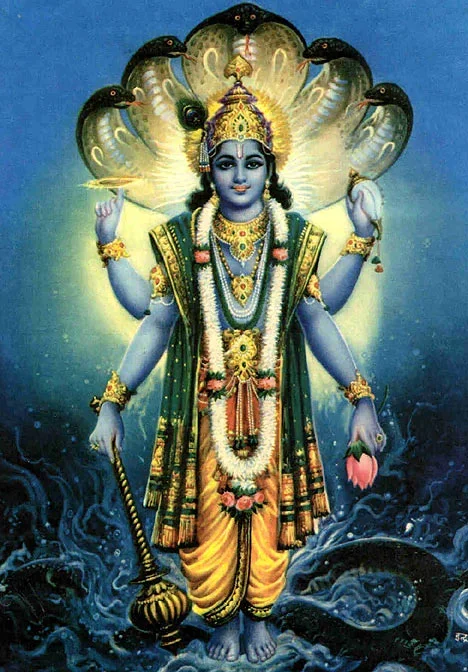
By S Swaminathan
Vishnu Sahasranama is the most popular sahasranama (sahasranama means 1000 names of the Lord) in India. South Indians don’t know much about Sri Ramcharithamanas or Hanuman Chalisa of Tulsidas. North Indians don’t know much about the great Thevaram (saivaite) and Divya Prabhandham (Vaishnavaite) hymns of Tamil saints. But like Bhagavad Gita, Vishnu Sahasramnamam became popular due to the great works of Swami Chinmayananda, Acharya Vinobha Bhave, Anandamayi and other religious leaders.
Adi Sankara was a passionate commentator. He wrote commentaries on many Hindu scriptures. When he was in Kashmir, he asked his disciple to bring one book from the book shelf to start some new work. He brought Vishnu Sahasranama. But Sankara was not happy. He sent another disciple to get a book. He also brought the same Sahasranama. When he was thinking about it, Goddess Saraswati appeared before him and asked him to go ahead with the commentary (Source for this anecdote: Anna’s commentary on Sahasranama in Tamil by Ramakrishna Mutt).
Second Anecdote
Kuthanur in Tamilnadu is famous for its ancient Saraswati temple. This is one of the rare temples for Goddess Saraswati. A boy by name Purushothaman went to Kuthanur for Vedic studies. But he was the dullest boy in the class. His father Sarangapani Dikshithar of Kumbakonam was a great scholar. This hurt him more. Being the son of a big pundit he wanted to learn at least the basics. One day a Vaishnavite saint noticed that he was very sad advised him to recite Vishnu sahasranama. Suddenly he got a big boost in his studies and went to the temple for more prayers. There Goddess Saraswati appeared as a woman and asked him to stick out his tongue to give her betel leave and supari. When he was hesitant to accept the spit from a woman’s mouth, a poet came that way and realised she was goddess Saraswati herself. He accepted her Prasad and became a great Tamil poet by name Ottakkuthan. He gave the town the name Kuthanur. Though Purushothaman did not become that famous he also studied well and became a scholar. That is why we remember him after one thousand years today.
Three Commentaries
Adi Sankara, Parasara Bhatta and Sri Madhwa wrote commentaries on it. When Bhisma was lying on the bed of arrows after the great war, Krishna asked Yudhistra to get Sahasranama from the mouth of Bhisma. It Is in the Anusasana Parva of Mahabharata. Scholars of ancient India used to recite Upanishad, Gita ,Rudram, Purushasuktam and Vishnu Sahsranama every day.
This stotra is like a cure for all sorts of problems. Anyone under the evil influence of 27 stars, 9 Grahas or 12 zodiac signs will get rid of the evil influence once one reads it.
The stotra was originally done by Sanakathi Rishis. Bhisma got it from them. It has got ancient names of gods. Some of the names like Vrsakapi, Suparna etc are from ancient Vedas. One who reads it will find lots of similarities with Bhagavad Gita. Names of all Hindu Gods are there in it. Some names have links with Indus Gods (Please read my article Vishnu seal in Indus Valley civilization).
Ayurveda books prescribed it as a medicine for diseases. Astrology books have prescribed it for Graha peetas. Dharma Sastra scriptures have prescribed it to get rid of nightmares and inauspicious signs or bad omens.
It is believed particular slokas are effective for solving particular problems. Astrologers and priests are experts in this field
(Contact for more details: [email protected] or [email protected] ).
